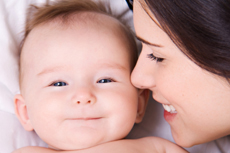 There is nothing more magical than your baby smiling at you for the first time. There are so many developmental changes that occur over the first year of a baby’s life. Sometimes it is hard to keep track of all the progress they make from week to week or month to month. As parents we just want to give our child every opportunity for a healthy, happy life.
There is nothing more magical than your baby smiling at you for the first time. There are so many developmental changes that occur over the first year of a baby’s life. Sometimes it is hard to keep track of all the progress they make from week to week or month to month. As parents we just want to give our child every opportunity for a healthy, happy life.
As pediatricians we consider the smile part of social and language development. It’s important to give your baby as many opportunities to stimulate the part of the brain responsible for sociability and speech. This means starting from a young age with talking to your baby and making faces (smiling, sticking out your tongue out). It’s never too young to start this silly interaction. You can also verbalize continually about your activities as you go through the day with your child. Although they do not understand what you are saying initially, this is how they learn (repetition and context). We know that babies who hear more speech from parents develop their speech more rapidly and extensively. We also know that televisions and computers do not help develop speech, even so called “educational programs.” We also know that adults and older children speak 500-1000 fewer words per hour when the television is on, even if it is just on in the background. For this reason, the American Academy of Pediatrics recommends no screen time until 2 years old and then limiting it.
Reading is another great way to develop a child’s speech and language. Sometimes it seems silly to read a book to a 6 week old, but if you choose a colorful book and use expressive voices and tones, reading, even at a very young age, can be a wonderful teaching opportunity. It can be especially useful as part of your daily routine, such as prior to bedtime or naps to settle down your child.
The other part of the smile is of course the dental care for your child. Once the first tooth erupts it is recommended that you start cleaning with a tiny amount of fluoride toothpaste. You should try to start getting into the routine of brushing your child’s teeth twice daily, and especially before bedtime after the last meal, bottle or nursing session. Sometimes supplementation with additional fluoride drops or chews are recommended, but please consult with your pediatrician and dentist to determine if your child would benefit from this.
No matter the choices you make with your child, try to cherish these moments. They grow up too quickly and you never know the last time your “baby” will want to crawl into your lap for a snuggle. My mother always said, “When you have a child, the nights are long and the years are short.”